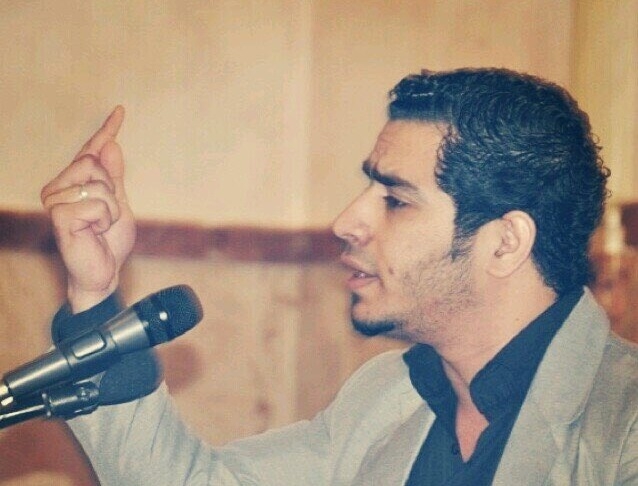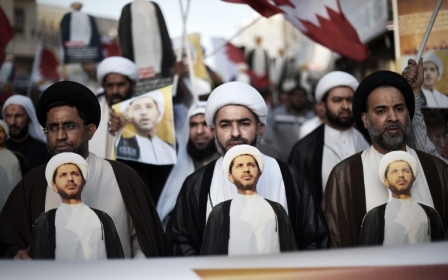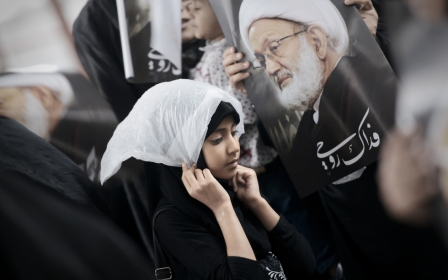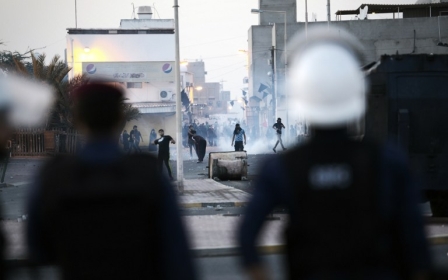Bahrain arrests 'political poet' amid free speech crackdown

Bahrain has extended its crackdown on freedom of speech with the detention of a well-known poet for “political poetry”, to the dismay of campaigners who say the country is making criminals of anyone who criticises the government’s repressive policies.
The arrest this week of poet Khalil al-Ismael, who is famous for criticising the Gulf kingdom’s human rights record, came after the charging of Nazeeha Saeed, a journalist, which Human Rights Watch said proved the Bahraini government was undermining freedom of expression and media freedom.
Ismael, who is being represented by leading Bahraini human rights lawyer Mohammed al-Tajer, was arrested on Saturday as he left the village of Duraz, the scene of ongoing protests after Bahrain’s government stripped the country’s highest ranking Shia cleric and Dirza resident, Sheikh Isa Qassim, of his citizenship.
Ismael, 27, has been charged with attending an “illegal demonstration” and reading out a “political poem”. Protests in Duraz are ongoing and the poet’s detention follows the arrest of several dozen protesters last week.
The poet, who is known for his strident verses, is being held in the infamous Jau prison, where there have been ongoing reports of maltreatment of prisoners. If convicted, his lawyer fears he could face “several years” in prison.
His lawyer Tajer, who is himself subject to a travel ban by the Bahraini authorities, told Middle East Eye that his client denied the charges against him. He said that Ismael is a resident of Duraz and was arrested at a checkpoint as he left the village to visit family members.
He added: “My client is a very well known poet, famous for holding the government to account over human rights. He talks about human rights, martyrs, dignity and violations by the state. These are thoughts that are not welcome here in Bahrain today. He knew one way or another he would be arrested eventually.”
Bahraini authorities quickly set up checkpoints around Duraz following the move against Qassim on June 20, refusing entry to those attempting to enter.
The heavy police presence in Duraz also comes amid a wider crackdown that has seen human rights defenders jailed and al-Wefaq, the largest Shia opposition group in Bahrain, banned.
Qassim has since been charged with misappropriating religious funds, in a move seen by many as an attempt to undermine the country’s minority Shia community.
Top journalist charged
Ismael’s arrest this weekend came as it emerged that the Bahraini government had charged prominent journalist Nazeeha Saeed, a correspondent for a French media outlet, with violating the country’s licensing laws for journalists.
According to Human Rights Watch, the criminal charges against the France24 journalist violate her right to free expression and further undermines media freedom in Bahrain. She is also subject to a travel ban.
“Bahrain is making criminals of anyone who criticises the government’s increasingly repressive policies,” said Joe Stork, deputy Middle East director at Human Rights Watch.
“Any government that claims to support press freedom needs to speak out loud and clear in support of Nazeeha Saeed.”
The charges against Saeed come after the Information Affairs Authority reportedly refused to renew the journalist’s licence, citing “the unsatisfactory evaluation of her performance by our specialists”.
Another journalist based in Bahrain, who requested anonymity, told Human Rights Watch that the agency has refused at least two other journalists who had been working for foreign media this year.
Saeed told Bahrain's Independent Commission of Inquiry into protests in 2011 that she had witnessed security forces shooting dead a 61-year old protester at close range during anti-government demonstrations.
She was later arrested accused or working as part of a terrorist cell and, according to evidence she gave in court, she was subjected to serious physical abuse including being beaten with a hose during her time in custody.
Saeed, a Bahraini citizen, filed a criminal complaint against the security officers she said were responsible but, in November 2015, the justice ministry said there was “insufficient evidence” to prosecute them.
UN human rights experts have repeatedly warned that state licensing of journalists violates freedom of expression.
“Bahrain’s repressive tendencies clearly illustrate why governments should have no role in saying who should be allowed to practice journalism,” Stork added.
Saeed is also one of 23 people subjected to travel bans since the start of June. They include activists, trade union leaders, teachers’ and nurses’ representatives, the president of the Bahrain chapter of Transparency International and lawyers, including Mohammed al-Tajer.
Democracy campaigners have been documenting the increasing crackdown with dismay in recent weeks, but have taken heart after US presidential hopeful Hillary Clinton appointed Tim Kaine as her running mate.
The senator was one of seven American politicians who called on Secretary of State John Kerry to reconsider arms sales to Bahrain in the wake of the crackdown.
In a letter addressed to Kerry, the bipartisan group of senators requested that the State Department rethink arms sales to the key Gulf ally if Bahrain's leadership did not protect the rights freedom of speech and freedom of assembly.
The letter followed a State Department report to Congress critical of Bahrain.
Middle East Eye propose une couverture et une analyse indépendantes et incomparables du Moyen-Orient, de l’Afrique du Nord et d’autres régions du monde. Pour en savoir plus sur la reprise de ce contenu et les frais qui s’appliquent, veuillez remplir ce formulaire [en anglais]. Pour en savoir plus sur MEE, cliquez ici [en anglais].




